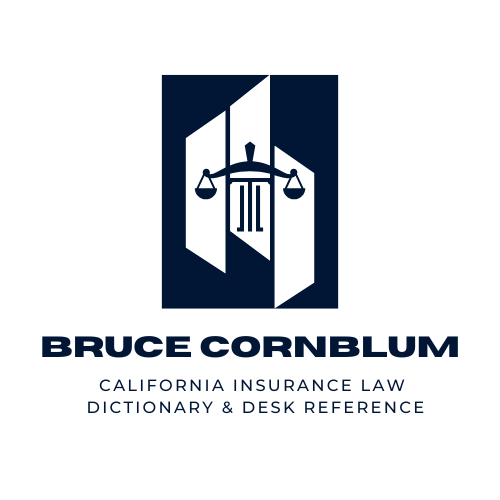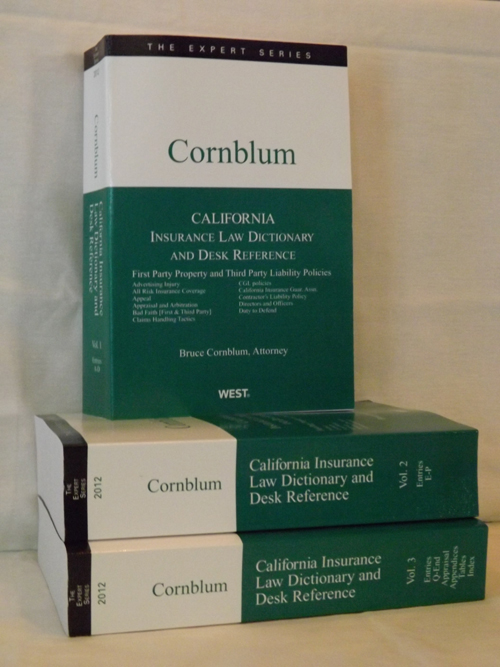§ P106.02:1 In general
Under California law an insurer’s erroneous failure to pay benefits under a policy does not necessarily constitute bad faith entitling the insured to recover tort damages. The ultimate test of bad faith liability in first party cases is whether the refusal to pay policy benefits was unreasonable. In other words before an insurer can be found to have acted tortiously, i.e. in bad faith, in refusing to bestow policy benefits, it must have done so “without proper cause”. [Opsal v. USAA (1991) 2 Cal.App.4th 1197, 1205, 10 Cal.Rptr.2d 352]
An insurer may act in breach of contract in failing to pay benefits, but such breach may not be “bad faith”. See California Shoppers Inc. v. Royal Globe Ins. Co. (1985) 175 Cal.App.3d 1, 54-55, 221 Cal.Rptr. 171. The breach of contract may be based upon disputed facts (California Shoppers Inc. v. Royal Globe Ins. Co., supra) or the breach may be based upon a reasonable though erroneous interpretation of dictum in an appellate decision. [Opsal v. USAA, supra (reliance upon a footnote in a previous California Supreme Court decision)]
“Proper cause” may exist so as to eliminate bad faith liability, as opposed to breach of contract, where there exists a genuine issue as to the insurer’s liability. [Opsal v. USAA, supra] See § G11 GENUINE ISSUE DOCTRINE. “Proper cause” does not exist where a dispute is “non-genuine”. Where there is a legitimate basis for the insured to dispute the position of the insurer causing a withholding of benefits or delaying the payment of benefits when due, the court will not apply the genuine issue doctrine thereby eliminating the insured’s cause of action for bad faith. There are many illustrations of “non-genuine disputes”. See § G11 GENUINE ISSUE DOCTRINE [§ G11:2 Non-genuine dispute by insurer]; § B2 BAD FAITH LAWSUIT – FIRST PARTY [§ B2:5].
§ P106.02:2 Insurer’s denial based upon a California court opinion
“Proper cause” exists to deny an insured’s claim, though later proved to be an erroneous denial when the insurer relies upon an existing Court of Appeal or Supreme Court opinion. [Bosetti v. US Life Ins. (2009) 175 Cal.App.4th 1208, 1239, 96 Cal.Rptr.3d 744 (rule applies even though the Bosetti court disapproved of the opinion relied upon by the insurer)]
Denial of claim based upon “developing case law”
An insurer cannot be found liable for bad faith for denying a claim when insurance law regarding the term in question was “still developing”. [Filippo Industries v. Sun Insurance (1999) 74 Cal.App.4th 1429, 1438-1439, 88 Cal.Rptr.2d 881, following Opsal v. USAA (1991) 2 Cal.App.4th 1197, 1205, 10 Cal.Rptr.2d 352]
§ P106.02:3 “Time” period when “proper cause” for denial determined
The reasonableness of the insurer’s decision and action must be evaluated as of the time that the decisions were made. The evaluation cannot be fairly made in light of such subsequent events which may provide evidence of the insider’s errors. [Chateau Chambray v. Assoc. Limited Ins. (2001) 90 Cal.App.4th 335, 347, 108 Cal.Rptr.2d 776 (insured disputed valuation supported by evidence)] See § H10 HINDSIGHT [§ H10:5 Time for determining “bad faith” conduct on the part of an insurer is determined at the time the decision to deny benefits is made].
§ P106.02:4 Extrinsic facts favoring an insured’s claim; lack of “proper cause” – third party liability policy
Facts known to the insurer which are extrinsic to the third party complaint, may give rise to the duty to defend even if the complaint does not reflect a potential of liability under the policy. See § E59 EXTRINSIC FACTS – DUTY TO DEFEND.
Genuine issue doctrine
Where a third party complaint alleges facts giving rise to a “potential for coverage” under a liability policy, the genuine-issue-doctrine is not a defense to an insurer’s obligation to provide a defense to the insured. [Century Sur. Co. v. Polisso (2006) 139 Cal.App.4th 922, 952, 43 Cal.Rptr.3d 468] See § G11 GENUINE ISSUE DOCTRINE [§ G11:9 Third party liability].
§ P106.02:5 Duties of insured [first party loss]; “proper cause” to deny benefits
An insurer can withhold payment of a claim made by an insured where the insured has failed to perform required duties described in the policy under the paragraph entitled DUTIES IN THE CASE OF LOSS. See § D80.04 DUTIES OF INSURED [FIRST PARTY LOSS]. Such duties include:
1. Giving the insurer timely notice of the loss. See § N35 NOTICE OF CLAIM OR ACCIDENT.
2. Cooperation with regards to the insurer’s investigation as well as the insured protecting the property from further loss. [Abdel Hamid v. Fire Ins. Exchange (2010) 182 Cal.App.4th 990, 999, 106 Cal.Rptr.3d 26] See § P15 PROTECT PROPERTY; § E44 EXAMINATION UNDER OATH.
3. Providing a proof of loss. See § P105 PROOF OF LOSS.
Until the insured performs required duties and conditions set forth in a first party policy the insurer has “proper cause” to refuse to pay benefits. [Abdel Hamid v. Fire Ins. Exchange, supra] See § B20 BREACH OF CONTRACT [§ B20:1.01]. An insurance company has an obligation to assist the insured to recover policy benefits. See § B2 BAD FAITH LAWSUIT – FIRST PARTY [§ B2:3.5.1]. The insurer cannot perform subterfuges and/or evasions to deprive an insured of policy benefits. See § B2 BAD FAITH LAWSUIT – FIRST PARTY [§ B2:5.3].
§ P106.02:6 Duties of insured; “proper cause” for insurer to deny claim – third party suit against insured
An insured has a duty to cooperate with the insurer. The duty includes a requirement to disclose all pertinent facts, assist in giving evidence. The policy provides that no action will lie against the insured until all of the policy terms are complied with. See § C116 COOPERATION CLAUSE. The liability policy’s claims provisions must be complied with. See § C31 CLAIM; §C33 CLAIM-MADE POLICY.
The insured must comply with the liability policy’s “no-action-clause” provisions. See § N18 NO-ACTION-CLAUSE.
The insured must not be in violation of the “no-voluntary-payment” clause. See § N19 NO-VOLUNTARY-PAYMENT CLAUSE.
Where grounds exist for the insurer to deny coverage (see § D25 DENIAL OF COVERAGE), the non-payment of policy benefits would be proper. [§ D25:1]
BOLD references are to sections in Bruce Cornblum’s 3-volume text entitled CALIFORNIA INSURANCE LAW DICTIONARY AND DESK REFERENCE, 2011 Edition. This 3-volume text is available through Thomson West Publishing at 1-800-344-5008.

